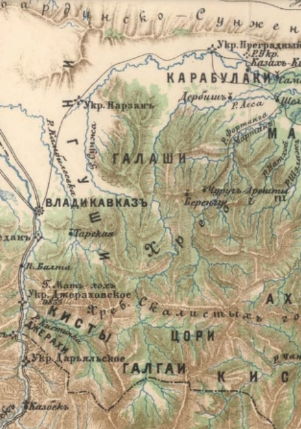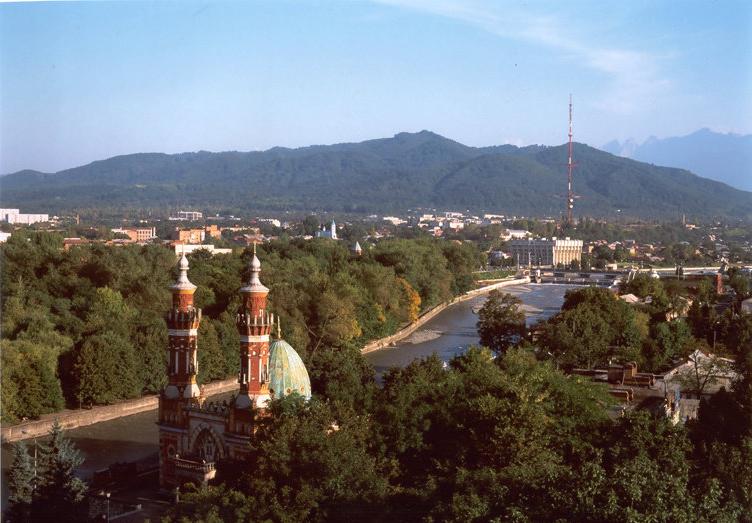|
Dzherakh
The Dzherakh, also spelled Jerakh ( inh, ЖӀайрахой, Žyajraxoj), historically also known as Erokhan people, were a historical Ingush ethnoterritorial society, today a tribal organization/clan (''teip''), that was formed in the Dzheyrakhin gorge, as well as in the area of the lower reaches of the Armkhi River and the upper reaches of the Terek River. Dzherakh first became known in the Russian sources in the 16th century, under the name ''Erokhan people'' (russian: Ероханские люди, Erokhanskie lyudi). History The first mention of Dzherakh was in 16th century, in Russian documents as ''Erokhan people''. The Dzherakhs were also mentioned by Georgian prince, historian and geographer, Vakhushti Bagrationi in 1745. The first contact of Dzherakh with Russian was in 1833, during the punitive expedition on Mountainous Ingushetia, done by General Abkhazov. Were known for their raids during the Caucasian War, together with Kists ('' Fyappiy'') and Tagaurs. C ... [...More Info...] [...Related Items...] OR: [Wikipedia] [Google] [Baidu] |
Fyappiy
The ''Fyappins'' ( inh, фаьппий, fäppiy) were an Ingush subgroup (''society'') that mostly inhabited the mountainous Fappi region of Ingushetia in the Caucasus. Historically they bordered on the west with Dzherakh, on the east with Khamkhins, on the north with Nazranians, and lastly in the south with Gudomakarians. The centre of the society was the fortified village (''aul'') of Erzi or Metskhal. During the 16–17th centuries, part of the ''Fyappins'' migrated to Tusheti, Georgia, due to a lack of land. The descendants of the migrants are known as Bats people. In the 17–18th centuries, another wave of migration accured, to the region of Aukh (modern day Dagestan). In 1733, due to the worry of expansion of Ottoman Turks in the region, ''Fyappins'' tried to establish ties with Kingdom of Kartli. As the Russian Empire started expanding its territories in the Caucasus Region 19th century, Caucasian War broke out. During the war, ''Fyappin'' Society was devasted aft ... [...More Info...] [...Related Items...] OR: [Wikipedia] [Google] [Baidu] |
Ingush People
The Ingush (, inh, ГIалгIай, translit=Ghalghaj, pronounced ) per Oxford dictionary "a member of a people living mainly in Ingushetia in the central Caucasus." Ingushetia is a federal republic of Russian Federation. The Ingush are predominantly Sunni Muslims and speak the Ingush language. According to 19th-century scientist Semen Bronevski the Ingush are known as Kisti, Ghalgha, Ingushi and they use the names interchangeably. According to the German scientist Peter Pallas who visited the Caucasus the Ingush are known as Loamaro, Kisti, Ghalghai, Ingush. Etymology The name ''Ingush'' is derived from the ancient village ''Angusht'', which was renamed into ''Tarskoye'' and transferred to North Ossetia in 1944 after the deportation of 23 February 1944, a.k.a. operation "Lentil". The Ingush, a nationality group indigenous to the Caucasus, mostly inhabit Ingushetia. They refer to themselves as Ghalghai (from Ingush: ''Ghala'' ("fortress" or "town") and ''ghai'' ("inhabita ... [...More Info...] [...Related Items...] OR: [Wikipedia] [Google] [Baidu] |
Ingush Societies
Ingush societies/shahars ( inh, ГIалгIай шахьараш, Ghalghaj šaꜧaraš) were territorial associations of the Ingush based on the geographical association of several villages and intended for conditional administrative-territorial delimitation of the Ingush ethnic group. The formation and functioning of most of them dates back to the late Middle Ages (XVI-XIX centuries). During this period, their boundaries, number and names changed. The names of societies mainly came from the names of the area of their localization, that is, they were based on the geographical principle. Despite the fact that during this period the Ingush lived in relatively closed conditions of mountain gorges, which contributed to more demarcation in terms of territoriality than rallying around a single center, they retained the self-consciousness of a single ethnic group based on a common culture and a single language. Ingush societies in the literature are sometimes called "shahars" ( in ... [...More Info...] [...Related Items...] OR: [Wikipedia] [Google] [Baidu] |
Furtoug
Furtoug (russian: Фуртоуг, inh, Фуртовг, Furtovg) is a rural locality (aul) in Dzheyrakhsky District of the Republic of Ingushetia, Russia. Furtoug is one of the 6 rural localities comprising Dzheyrakh rural settlement. Furtoug was a birthplace of two influential figures in Ingush history - one of the first Ingush scholars Chakh Akhriev and famous revolutionary Gapur Akhriev. History Archaeological evidence suggests that the area has been inhabited since the 9th century, with a variety of Bronze Age artifacts, such as bracelets, mirrors, earrings, rings, and ceramics, having been discovered in the local necropolises. In the 18th century, Furtoug was home to several famous builders of towers, cult, and burial structures, including Dugo Akhriev, Dyatsi Lyanov, and Khazbi Tsurov. The mausoleum of Dugo Akhriev is still standing today. In the latter half of the 18th century, members of the Tsurov and Lyanov clans of Ossetians settled in Furtoug and assimilated with the ... [...More Info...] [...Related Items...] OR: [Wikipedia] [Google] [Baidu] |
Dzheyrakh
Dzheyrakh ( inh, ЖӀайрах, Žyajrax; russian: Джейрах) - is a village and administrative center of Dzheyrakhsky District, in the Republic of Ingushetia, Russia. Etymology The name "Dzheyrakh" is associated with the Arabic name Jarrah ("inflicting wounds"). According to Suleymanov, the name of the village is associated with Arab military commander Djarakh ibn Abadallah al-Khakami, who was a vicar of the Arab caliph in Armenia and northern Iran between 724 and 730 A.D. According to the notion, Al-Jarrah ibn Abdallah led military campaign in the Northern Caucasus through the Darial Gorge. A connection with the word Ingush ''zhar'' (жӏар) — cross, is also possible. Geography Dzheyrakh is situated on the left bank of Armkhi river, south-west from the capital of Ingushetia Ingushetia (; russian: Ингуше́тия; inh, ГӀалгӏайче, Ghalghayče), officially the Republic of Ingushetia,; inh, Гӏалгӏай Мохк, Ghalghay Moxk is a republic o ... [...More Info...] [...Related Items...] OR: [Wikipedia] [Google] [Baidu] |
Terek River
The Terek (; , Tiyrk; , Tərč; , ; , ; , ''Terk''; , ; , ) is a major river in the Northern Caucasus. It originates in the Mtskheta-Mtianeti region of Georgia (country), Georgia and flows through North Caucasus region of Russia into the Caspian Sea. It rises near the juncture of Caucasus Mountains, the Greater Caucasus Mountain Range and the Khokh Range, to the southwest of Mount Kazbek, winding north in a white torrent between the town of Stepantsminda and the village of Gergeti toward the Russian region North Ossetia and the city of Vladikavkaz. It turns east to flow through Chechnya and Dagestan before Water divide, dividing into two branches which empty into the Caspian Sea. Below the city of Kizlyar it forms a swampy river delta around wide. The river is a key natural asset in the region, providing irrigation and hydroelectric power in its upper reaches. The main cities on the Terek include Vladikavkaz, Mozdok, and Kizlyar. Several minor Hydroelectricity, hydroelectric ... [...More Info...] [...Related Items...] OR: [Wikipedia] [Google] [Baidu] |
Russia
Russia (, , ), or the Russian Federation, is a List of transcontinental countries, transcontinental country spanning Eastern Europe and North Asia, Northern Asia. It is the List of countries and dependencies by area, largest country in the world, with its internationally recognised territory covering , and encompassing one-eighth of Earth's inhabitable landmass. Russia extends across Time in Russia, eleven time zones and shares Borders of Russia, land boundaries with fourteen countries, more than List of countries and territories by land borders, any other country but China. It is the List of countries and dependencies by population, world's ninth-most populous country and List of European countries by population, Europe's most populous country, with a population of 146 million people. The country's capital and List of cities and towns in Russia by population, largest city is Moscow, the List of European cities by population within city limits, largest city entirely within E ... [...More Info...] [...Related Items...] OR: [Wikipedia] [Google] [Baidu] |
Vakhushti Bagrationi
Vakhushti ( ka, ვახუშტი, tr) (1696–1757) was a Georgian royal prince (''batonishvili''), geographer, historian and cartographer. His principal historical and geographic works, ''Description of the Kingdom of Georgia'' and the ''Geographical Atlas'', were inscribed on UNESCO's Memory of the World Register in 2013. Life A natural son of King Vakhtang VI of Kartli (ruled 1716–24), he was born in Tbilisi, 1696. Educated by the brothers Garsevanishvili and a Roman Catholic mission, he was fluent in Greek, Latin, French, Turkish, Russian and Armenian. His name Vakhushti derives from Old Iranian ''vahišta-'' ("paradise", superlative of ''veh'' "good", i.e., "superb, excellent"). Its equivalent in Middle Persian is ''wahišt'' and in New Persian ''behešt''. In 1719 and 1720, he took part in two successive campaigns against the rebel duke (''eristavi'') Shanshe of the Ksani. From August to November 1722, he was a governor of the kingdom during his father's absenc ... [...More Info...] [...Related Items...] OR: [Wikipedia] [Google] [Baidu] |
Ivane Abkhazi
Ivane Abkhazi ( ka, ივანე აფხაზი) or Ivan Nikolayevich Abkhazov (russian: Иван Николаевич Абхазов) (1764 or 1786 – 1831) was a nobleman from Georgia, who served in the Imperial Russian military and rose to the rank of major-general during the Caucasus War. Abkhazi, born of a princely family from Kakheti, was one of the first Georgian noblemen who joined the Russian military on the Tsar's annexation of Georgia in 1800. He rose in seniority during the war with Iran (1804–13), being an aide to General Pyotr Kotlyarevsky. He was promoted to major in 1812, colonel in 1821, and major-general in 1826. He was instrumental in defeating the rebel prince Aslan-Bey in Abkhazia in the 1820s. During the second war with Iran (1826–28) Abkhazi was chief of staff of General Nikita Pankratiev's corps and then a military administrator of the South Caucasian Muslim provinces. In 1830, he commanded a punitive force which forced the Ingush and Ossetia ... [...More Info...] [...Related Items...] OR: [Wikipedia] [Google] [Baidu] |
Caucasian War
The Caucasian War (russian: Кавказская война; ''Kavkazskaya vojna'') or Caucasus War was a 19th century military conflict between the Russian Empire and various peoples of the North Caucasus who resisted subjugation during the Russian conquest of the Caucasus. It consisted of a series of military actions waged by the Russian Imperial Army and Cossack settlers against the native inhabitants such as the Adyghe, Abaza– Abkhaz, Ubykhs, Chechens, and Dagestanis as the Tsars sought to expand. Russian control of the Georgian Military Road in the center divided the Caucasian War into the Russo-Circassian War in the west and the conquest of Chechnya and Dagestan in the east. Other territories of the Caucasus (comprising contemporary eastern Georgia, southern Dagestan, Armenia and Azerbaijan) were incorporated into the Russian Empire at various times in the 19th century as a result of Russian wars with Persia. The remaining part, western Georgia, was taken by the ... [...More Info...] [...Related Items...] OR: [Wikipedia] [Google] [Baidu] |
Armkhi
Armkhi ( inh, МохтIе, ''Moxthe''; russian: Армхи) is a village in Dzheyrakhsky District of the Republic of Ingushetia, located on the ''Armkhi'' or ''Kistinka'' river ( inh, Ӏарам-хий, Кисти-хий, ''Aram-khi'', ''Kisti-khiï''; ka, ქისტეთისწყალი, ''Kistetis-tskali''; russian: Армхи, Кистинка). The village is known for its year-round recreation resort. Armkhi is one of six rural localities constituting the Dzheyrakh rural settlement. History The name of the village derives from the river ''Armkhi'', a tributary of the Terek river. Several variations exist with regard to the meaning of the term "Armkhi". One is that the toponym derives from Ingush for "prohibited water/river"; another, that it comes from the Ingush words ''amr'' 'lake' and ''khi'' 'water'. The hydronym ''Kistinka'' derives from one of the old Ingush ethnonyms — '' Kisti''. In 1745, Vakhushti Bagrationi mentions it as ''"Kistetian river"'' a ... [...More Info...] [...Related Items...] OR: [Wikipedia] [Google] [Baidu] |




